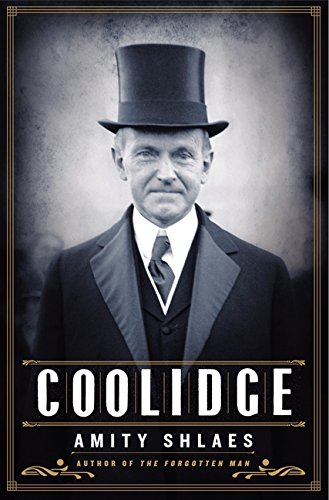- Features
- Description
- Similar Items
Binding:
HardcoverBrand:
Brand: HarperEAN:
9780061967559Label:
HarperManufacturer:
HarperModel:
Size:
Warranty:
A Dialogue Between Amity Shlaes and Paul Volcker, former chairman of the Federal Reserve Bank

Amity Shlaes: I like Coolidge, but do you, Paul, think he matters? Coolidge was president in the 1920s. That’s a long time ago.
Paul Volcker: Well there are some parallels to current times. During his time, Coolidge was under great pressure, much like today. Even before he was president, as governor of Massachusetts, Coolidge was forced into the Boston police strike. He took a principled stance.
AS:You mean, he fired the police, who were good people. But he felt he had to fire them, because Boston fell into chaos when they left their post.
PV: Yes, that attracted a lot of attention, and for good reason. He was a good man himself. Sometimes I wish we had more principled men serving in government now.
AS: Is that kind of principled action even possible today?
PV: It is obviously difficult. But in the area of monetary policy the received wisdom has been that by removing decision-making a bit away from raw political life, you have a better chance of following reasonable, disciplined policy, and taking a longer term view. That is the hope.
AS: Coolidge tried to live a clean life. Harding had partied. Does that matter?
PV: Yes.
AS: What about the Federal Reserve Bank’s policy in the late teens and early 1920s? The Fed’s boss then, W.P.G. Harding, took a lot of criticism for supporting tightening.
PV: Central banking theory was not very well developed in those days, and it certainly was not well developed in the United States. But there was a sense that since there was inflation, raising interest rates was appropriate. The policy was not terribly active; there were no concerted open market operations in those days. The Federal Reserve was more reactive than an initiating instrument. It so happened they had a big inflation followed by a big, but short, recession. There are debates to this day as to whether the Federal Reserve failed to react soon enough given the depth of the recession or whether the hands-off attitude led to the rapid recovery after they dealt with the inflation.
AS: At the Federal Reserve W.P.G. Harding raised interest rates 300 basis points, which was basically doubling it, to squeeze out inflation.
PV: 300 basis points is nothing anymore (laughs).
AS: Congress blamed the fed’s head back then for the recession. Is it hard to be the Fed Head when people blame you for recession? You had recessions.
PV: Of course! You’re willing to experience it once, you don’t like to have one twice.
AS: Are there ways Coolidge was better than Ronald Reagan? Or, at the least, does Silent Cal warrant an upgrade?
PV: Coolidge is forgotten and Reagan is a hero. Coolidge had the police strike, Reagan had the strike of the air traffic controllers. Coolidge didn’t like to spend money, Reagan liked to reduce taxes.
AS: What’s important?
PV: Coolidge balanced the budget. Saving, we don’t do that anymore. Instead we rely on Social Security and government. Now we fight about all the entitlements, those programs didn’t even exist back in Coolidge’s day.
AS: What’s your summary?
PV: What we understood was that Coolidge was kind of a do-nothing president. He took over for Harding, he was an honest guy, he was kind of open and frugal, but that was it. But in fact there’s so much to learn from Coolidge. Any president is going to face a lot of problems and Coolidge faced up to them. He produced, after Harding, honest government. He contributed to some degree of trust in government. Americans today need to read Amity’s biography to learn more about him.






